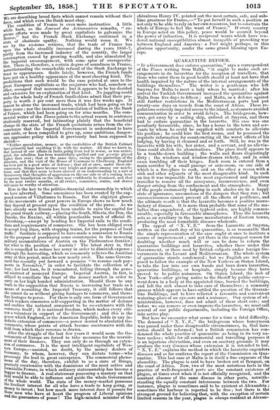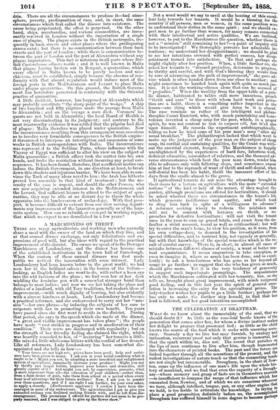QUARANTINE REFORM.
" Jr a Government does enforce quarantine," says a correspondent of the Times writing from Malta, "it ought to make such ar- rangements in its lazarettos for the reception of travellers, that those who enter them in good health should at least not have that health impaired by the nature of the internal arrangements of the buildings themselves." The writer is a gentleman who left Smyrna for Malta to meet a lady whom he married ; after his arrival the Turkish Government increased the quarantine against Malta from five days to fifteen ; and Malta, as a defence against still further restrictions in the Mediterranean ports had put twenty-one days on vessels from the coast of Africa. These re- gulations seriously impeded access to the island, as steamers avoided communication in order to avoid delays. The bridegroom, how- ever, got away by a sailing ship, arrived at Smyrna, and there had to endure quarantine in the lazaretto. His case was one peculiarly favourable, since, he has a house in the town and ser- vants by whom he could be supplied with comforts to alleviate his position ; he could hire the best rooms, and he possessed the requisite information for counteracting all the worst effects of his lodging, by having it cleansed and so forth. Still, he was in the lazaretto with his wife, her sister, and a servant, and no allevia- tions could abolish its abominations. The place itself appears to be a tumble-down building ; the walls and floors disgustingly dirty ; the windows and window-frames rickety, and in some cases tumbling off their hinges. Each room is entered from a main corridor by a small passage or ante-room, on one side of which is a fire-place to cook, and on the other a recess with a sink and other adjuncts of the most disagreeable kind. In such an inn it was impossible for the most experienced and ingenious traveller to remove all the annoyance, inconvenience, and even danger arising from the confinement and the atmosphere. Many of the people customarily lodging in such abodes are in a happy state of ignorance, unconscious of the dangers that they run ; but unconsciousness cannot prevent all the effects of pestilence, and the ultimate result is that the lazaretto becomes a positive manu- factory of disease. It is more than probable that some of the ma- ladies thus engendered, of the typhoid order, are highly commu- nicable, especially in favourable atmospheres. Thus the lazaretto acts as an auxiliary in the home manufactures of Eastern towns, producing the most formidable diseases wholesale. The appeal of "X. Y. Z." from the Lazaretto at Smyrna, written on the sixth day of his quarantine, is so reasonable that the simple representation of the case ought at once to institute a course of improvement ; and yet there is the strongest reason for doubting whether much will or can be done to reform the quarantine buildings and lazarettos, whether those under this Government, or those used by British subjects under foreign Go- vernments in the Levant and Mediterranean. The whole system of quarantine stands condemned ; but we English are not dis- posed to follow the example of the New Yorkers on Staten Island, to take the law into our own hands and burn down lazarettos, quarantine buildings, or hospitals, simply because they have proved to be public nuisances. On Staten Island, the mob of New York—after giving notice to the Sheriff by public outcry— went down in a body at the appointed time, burned the buildings, and left the sick almost to take care of themselves ; a summary process which appears to have settled the question of the Quaran- tine Buildings, and to have relieved a favourite and convenient watering-place of an eye-sore and a nuisance. Our system of ad- ministration, however, does not admit of these short cuts ; and before we can remove or even improve the lazarettos, we must call several of our public departments, including the Foreign Office, into active play. But here we encounter what seems for a time a fatal difficulty. The demand of "X. Y. Z.," the bridegroom whose honeymoon was passed under those disagreeable circumstances, is, that laza- rettos should be reformed ; but a British commission has con- demned the whole practice of quarantine as being in its very na- ture useless ; while for all commercial and travelling purposes it is an injurious obstruction, and even on sanitary grounds it may produce the very diseases whose extension it is intended to bar. "X. Y. Z." explains the method in which the lazaretto engenders diseases and so far confirms the report of the Commission on Qua- rantine. This last case at Malta is in itself a fine exposure of the absurdity. The plague is said to have broken out at Bengazi, on the coast of Africa. Now, two of the most notorious facts in the practice of well-frequented ports are the constant existence of plague, at times even when it is not officially recognized, and the constant absence of the saw disease in other ports, notwith- standing the equally constant intercourse between the two. For instance, plague is sometimes said to be existent at Alexandria ; sometimes the harbour is reported to be free ; but there is the strongest ground for believing that, with the exception of certain limited seasons in the year, plague is always resident at Alexan- dria. There are all the circumstances to produce it—bad atmo- sphere, poverty, predisposition of race, and, in short, the same circumstances which first called the disease into existenee. The cause being perpetuated, the effect is perpetual. On the .other hand, ships, merchandise, and various commodities, are inces- santly received in London without the importation of a. single case of plague. The plague exists in the British metropolis, fre- quently in back streets and other places where the predisposing causes exist ; but there is no communication between those back streets and the port of London ; while there is communication be- tween the port of London and the port of Alexandria without any plague importation. This fact is notorious in all ports where Bri- tish Customhouse officers reside ; and it is well known in Malta that plague having broken out in Bengazi, a quarantine, which every official in Malta knows to be purely useless and mis- chievous, must be established, simply because the absence of con- formity with that absurd regulation would induce most of the foreign ports in the Mediterranean and Levant to place Malta under plague quarantine. On this ground, the British Govern- ment has heretofore persevered in conformity with the Oriental practice of quarantine. A little incident, however, has happened at Alexandria which may probably constitute "the sharp point of the wedge." A ship of two hundred and fifty pilgrims made the passage from Malta to Alexandria ; and on the voyage a man died. Coroners' in- quests are not held in Alexanaria ; the local Board of Health is not very discriminating in its judgment ; and contrary to the most trustworthy evidence it was settled that the pilgrim had died of plague : Malta therefore was placed under quarantine. Now the inconveniences resulting from this arrangement were so serious as to involve very formidable consequences to the British empire : it threatened to interpose an interruption and suspension of some weeks in British correspondence with India. The inconvenience was represent sd to the Sublime Porte, whose influence with the -Viceroy of Egypt was sufficient to alter his view on the subject of Malta quarantine ; a British officer took the matter into his own hands, and broke the restriction without incurring any penal con- sequences. It has been found, therefore, that a sufficient motive can induce the British Government, in one direction at least, to break down this obsolete and injurious barrier. We have been able to con- vince the Turk of many ideas novel to him ; the Arab has hitherto proved less amenable to that kind of treatment ; but the ne- cessity of the case is urgent, and should the other Powers, who are now acquiring extended interest in the Mediterranean and the Levant, find sufficient leisure to attend to the subject of qua- rantine, they may be able at no distant day to throw the whole apparatus into the lumber-room of archmology. With that pros- pect, it becomes difficult to extract from our slow moving depart- ments any improvement of the lazarettos generally or of the laza- retto system. How can we rebuild, or even put in working repair, that which we expect to see demolished in a few years ?



























 Previous page
Previous page